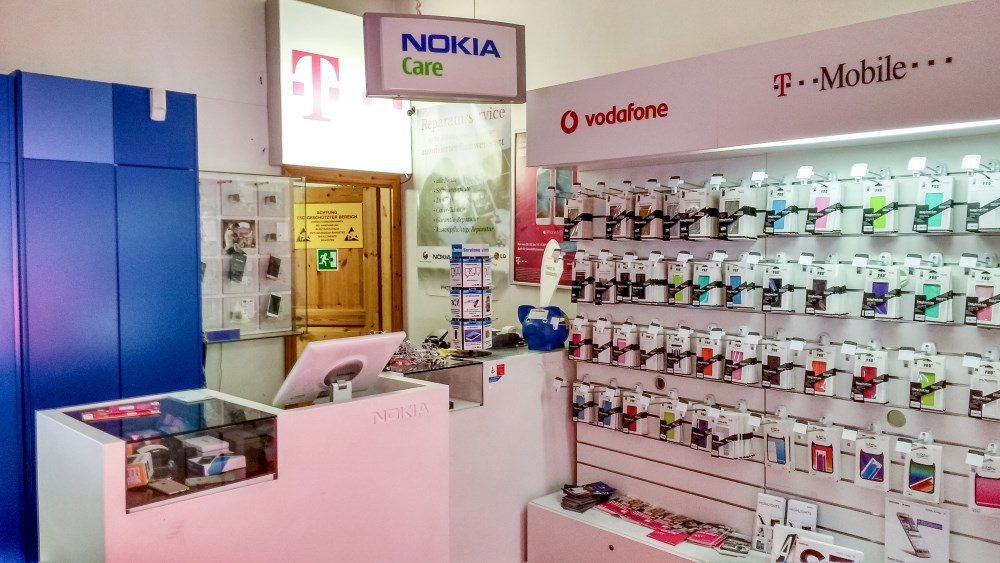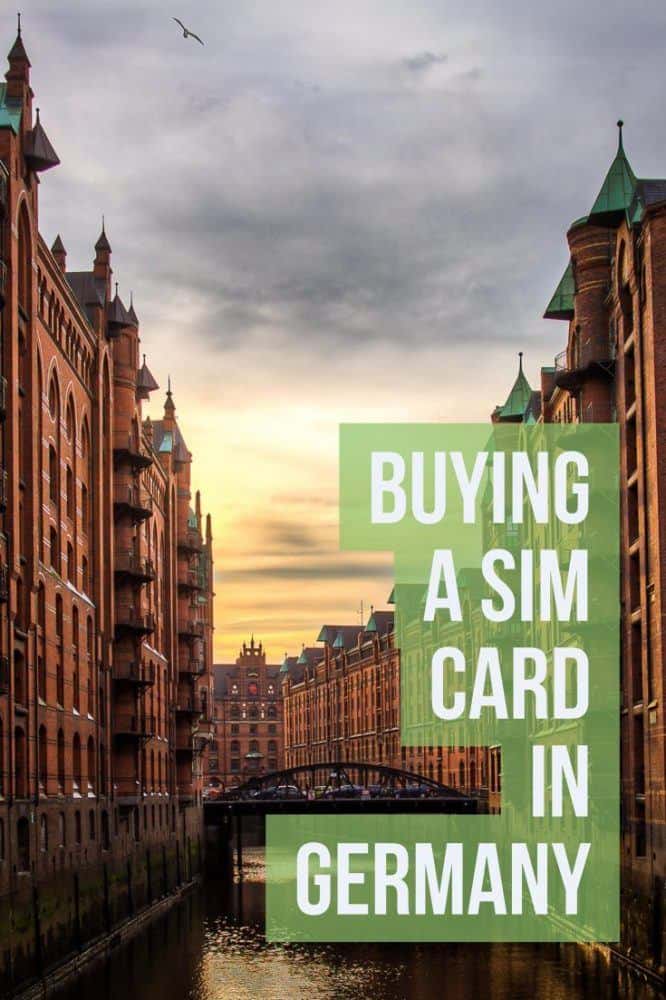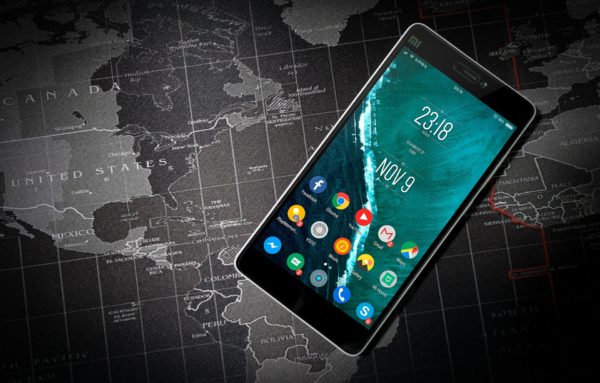Buying a SIM Card or eSIM in Germany
We may earn a commission from purchases you make after clicking links on this site. Learn more.There are plenty of amazing things about Germany besides just the beer. Although that’s amazing too, of course. I visited in winter, which is definitely the off-season. Luckily, that’s one of my favorite times to travel.
Besides the obvious of not having to deal with large crowds of tourists, It also means the Christkindl Markets were open and going strong.
There’s nothing better on a cold German evening than a hot ceramic shoe full of spiced and spiked Glühwein. Add a bratwurst or schnitzel, and that’s my idea of some satisfyingly unhealthy calorie consumption right there.
When it comes to staying connected, there are many options available, based on your data, text, and voice requirements. Costs are reasonable but not necessarily cheap, however, and the purchase and registration process can vary a lot.
Top-ups are easy to do, at least, and readily available at local gas stations, convenience, and grocery stores.
If you only need data, though, you’ll likely be better off with a travel eSIM. Prices are low, especially if you don’t need much data but even if you do, and there’s none of the hassle around buying or registering the card.
However you choose to do it, here’s what you need to know.
Companies
There are three major network providers in Germany, with many, many companies reselling their services.
Deutsche Telekom (formerly known as T-Mobile) is generally considered to have the best network. It has the best LTE availability and the most free Wi-Fi hotspot locations. Resellers include Congstar, ja!mobile, and Lebara Mobile.
Vodafone has a network almost as good as Deutsche Telekom, and includes roaming for all EU/EEA countries (except Switzerland) at the German rates. Resellers include Fyve, Otelo, and Lycamobile.
O2 has the smallest network, and while it has improved in recent years, it’s still more prone to congestion than the others. Unless you find a particularly great deal on offer, there’s no particular reason for travelers to use it. Resellers include ALDI Talk, NettoKOM, Ortel, mobile, and WhatsApp.
Need travel insurance for Germany?
Need travel insurance for Germany?
I only listed a few of the reseller options but there are many others. They’re generally cheaper and offer a wide range of incentives and offers. This can make them more attractive than the major players if you’ve got the time and energy to hunt them down.
Registering your SIM can be more of a hassle with the resellers, however: you’re unlikely to be able to do it in person, which likely means wading through an online portal (in German) to try and get it working.
Coverage is very good in towns and cities, but there are some surprisingly large black spots in the countryside and other remote areas with all networks. LTE is the standard option, with 5G rolling out. 3G networks have been shut down nationwide.
I bought a Vodafone SIM, as it was available at a store close to where I was staying, and cheaper than the Deutsche Telekom option while providing more data.
Travel eSIM for Germany
While prices for physical SIMs are reasonable in Germany, you may still find that a travel eSIM is both a cheaper and an easier option. I often use them when traveling internationally these days, and find them super-convenient.
If you’re in the country for a short period or don’t expect to use much data, you’ll likely save money with an eSIM from aloSIM or Airalo. I’ve sometimes found that aloSIM provides higher speeds, but have been happy with both companies.
Even if you need a lot of data, though, there’s often not much difference in price between the travel eSIMs and the local companies, with the big benefit that the eSIM version lets you get set up at home and be connected as soon as you arrive.
Like most travel eSIMs, those in Germany are data-only: you don’t get a local number. I use apps for everything from communication to transport these days, so the lack of a local number very rarely matters to me, but you might have different needs.
One thing worth noting: if you’re planning to travel to several European countries within a few weeks, it might be worth looking at some of the regional eSIM packages on offer.
There are too many to list each one separately (and they change all the time), but as a starting point, these are the Europe eSIM options from companies I’d actually consider using:
- aloSIM (34 countries)
- Airalo (39 countries)
- Nomad (30-35 countries)
- SIMOptions (29-39 countries)
- yeSIM (31 countries)
- easySIM (36 countries – free with any single-country eSIM)
If you’re new to eSIMs, they offer big benefits to travelers in terms of how quickly, easily, and (often) cheaply you can get connected when you arrive in a new country. Most recent phones support them, and you can read all about them here.
How to Buy a Prepaid SIM Card in Germany
When I arrived at Hamburg airport I was in a rush to catch my train, so didn’t check the availability of SIMs there. A quick search on Google suggests SIM cards are available at phone stores in the terminal, however, if you’ve got more time than me.
Outside the airport, SIM cards are available in grocery and convenience stores as well as specialty “Handy” stores. Yes, Germans call their cell phones “handys.”
Websites like Lebara.de (Telekom reseller) offer a SIM you can order for free and have delivered to a valid German address. I ordered one and gave my aunt’s address, but ended up leaving before it arrived.
Regardless of where you buy your SIM, it needs to be registered and a data/voice package set up. Registration can be done in official carrier stores and some major electronics stores, or via a video chat-based system called WebID.
Foreign credit cards aren’t always accepted for buying data and voice packages: if that happens to you, have a German friend available or just use cash.

To buy my card I walked to the local Handy store where I was staying in Timmendorfer Strand. I speak absolutely no German. The gentleman at the Handy store spoke only a few words of English, but generous use of hand gestures and grunting got me the available options and costs for each.
You’ll need your passport for registration, along with a German address. The easiest option is to use that of your hotel or hostel.
The whole process of buying the card and getting it set up was easy and painless. It can take up to two hours to activate with some companies, but I was connected within five minutes. My entire time spent in the store was about 15 minutes.
Prepaid SIM and eSIM Costs
Vodafone
A SIM card starter package cost €9.95, but came with €10 of credit, making it effectively free. That amount of credit buys a bundle with 6GB of data, unlimited domestic texts and calls, and 200 minutes/texts to elsewhere in the EU.
That package lasts four weeks: others with more or less data are also available, including a €20 version with 20GB of data, and a €79 pack with unlimited data.
The Telekom SIM package I was offered had less data for more money, and the store didn’t offer any O2 or reseller SIM’s.
Registration is free (it’s illegal to charge for it), but it’s not uncommon for Vodafone stores to charge an unofficial fee of up to €10 to do it. Stand your ground for as long as you’re willing to, or find somewhere else that doesn’t charge!
To check the balance on my Vodafone SIM, I dialed *100#
aloSIM
As is often the case, aloSIM and Airalo usually have near-identical pricing in Germany. I’ve sometimes found aloSIM to have higher speeds, which is why I prefer them, but have been happy with service from both companies. Use whichever one you like best!
They’re not the only travel eSIM companies, of course, and we’ve compared many of them in the past. Here’s how the best ones stack up price-wise in Germany: Nomad tends to have higher prices than the rest for smaller data packs, and better prices for large ones.
Topping Up
Vodafone
Topping up is as simple as going into a grocery or convenience store and finding the cards hanging by the checkout lanes. I found Vodafone top-up cards at REWE and Aldi grocery stores, and most gas stations also have them.
Top-ups can be done at the network’s websites, but these sometimes only accept German cards. There are third-party top-up services such as prelado.de that may accept some non-German credit cards but also have an option to use Paypal.
The most reliable way is going to a physical store, as they accept both cash and foreign credit cards. It’s quick and easy, and the top-up cards are available everywhere.
Get regular updates from the world of travel tech and remote work
News, reviews, recommendations and more, from here and around the web
Coverage and Data Speeds
Speeds were very good everywhere I tested them, although I didn’t go far from major cities on this trip. Whether I was just using my phone normally or tethering my laptop to it to get some work done, it was always fast enough for anything I needed to do.
With the travel eSIM companies, both aloSIM and Airalo use the O2 network: like I said, you should have similar coverage to the bigger players, but it’s more prone to congestion and slowdowns.
If that’s a concern, go for Nomad instead: it can use all three of the major networks, so you can just switch from one to another if you’re getting low speeds or no service.
EU Roaming
Germany is part of the European Union, so EU roaming regulations apply. These “roam like at home” rules ended roaming charges across much of Europe in 2017, letting you use a SIM card from any EU country across all the others at no extra charge.
There are some exceptions and limits, however, especially with large data packages. Double-check the exact details at time of purchase, but I’ve generally found roaming to be included with Vodafone.
If you’re using a travel eSIM and planning to roam elsewhere in Europe, it’s worth looking at the regional data packs I mentioned earlier as well.
Check out our guides to SIM cards and eSIMs in 70+ other countries here.









An even easier methid is to order a pay as you go SIM from Amazon.de and have it shipped in advance to your hotel
Thanks for this article! Would you recommend SIM-only contracts for someone moving to Germany and living there at least 2 years? Or at that point, would a contract with a provider make more sense? I am thinking the latter, but wondering your advice as well. Thanks!
I don’t know specifically for Germany, but in general you’ll get better deals with a contract than prepaid. If it was me, I’d ask about the options, then get a prepaid service for a month to make sure I was happy with coverage, data speeds etc, before switching to a contract if there were decent savings to be had.
Hello there Nicole. I am wondering if you have found a good SIM-Only contract as I too am in the same position as you (Staying in Germany for 3+ years).
Do not use Vodafone!
Very poor service and even worse customer service!
I traveled to Germany and bought CallYa Smartphone Special prepaid SIM-card in Berlin. I paid 35 euros even though it says 10 euros on the plan itself. I was told that my SIM will get activated in 3-4 hours. I had mobile internet right away, but could not make any phone calls (I had to make an urgent call). The next day I was traveling to Munich and decided to stop by a Vodafone shop to fix the issue since I had to make a call that day. The first staff member did not speak English very well, so he had to transfer me to an English speaking representative. He said that they could not help me. They don’t know what exactly the problem is, but something went wrong at their shop in Berlin, and that if I need help, I need to go back to the same shop in Berlin to get help. Really? Driving 600km for this? This is just ridiculous. I tried calling that Berlin shop from the shop phone and no one picked up. The staff member suggested me to buy a new SIM-card that will get activated in 24-48 hours. Are you serious? Great way to make money. Selling SIM-cards that don’t work and no one can help you with. After that, I asked if there is some English-speaking customer service that I can call. They gave me the number. I asked to use their phone to call since my SIM-card didn’t work. They said they won’t let me. The exact quote was “Go to a hotel and call from there”. And then the staff member said that they spent too much time on me already and that they can’t help me. It seems like the staff of this shop doesn’t realize that they work for Vodafone and not for their local shop. They expressed that it’s not their problem many times throughout our conversation. At that point, I just left.
Also, the internet stopped working once I left Germany even though they claim that the prepaid card is “EU Roaming inclusive”.
Not sure how Vodafone is still in business with such ridiculously poor customer service and lies at all levels of the company.
Did you use your own phone that you brought from the US? Or did you buy a phone there? Was your phone locked?
If you bought a locked phone, it needs to be unlocked (either by the company you bought it from or a third-party service) before you can use a SIM card from a different provider in it.
Are there any prepaid eSIMs available in Germany?
Not that I’m aware of. You can buy esim service from a few international SIM companies that will cover Germany, but it’s more expensive than a physical local SIM.
Reporting on recent experience with Vodafone in Germany (June 2019): If you’re in a smaller city, the Vodafone shops will tell you they are out of the prepaid cards (they aren’t, in fact, but don’t want to sell them to you because they don’t make enough $). Or — if they have them, they’ll claim that there’s a EUR 55 set-up fee, which apparently the stores are allowed to impose. If you’re in a large city like Munich, though, the Vodafone shop in the Marienplatz does a healthy tourist business so hasn’t had a problem with selling the prepaid cards, at least in the past.
That said, I lived in Germany for a year recently, and had a prepaid plan on Vodafone. They were okay, nothing exceptional. I tend to go with them when I go back because they’re cheaper than Telekom while having access to LTE.
For those asking about contracts for extended stays: Prepaid was the only option for me — contracts were 2 years minimum. The other thing to keep in mind if you go the contract route is that contracts work differently in Germany. You have to read the fine print very carefully and contact the provider (often in writing) many months in advance of contract end to notify them that you do not want to continue the contract. The assumption in Germany with pretty much all contracts is that the consumer *wants* to continue the contract, so they will automatically extend and you are on the hook for the full price of the contract if you haven’t notified them in the proper time that you don’t want to continue. They will sic collections on you if you don’t pay, even if you’re out of the country.
Also, whatever you do, do your research in advance. When we went to the local mall Vodafone kiosk to buy our cards a few years ago, the associate tried to steer us into a business contract that I hadn’t seen on their website, and he told us it would be no problem to cancel the contract if we could prove we’d moved out of the country. NOT TRUE!
Basically, the commissioned salespeople at any mobile provider will try to get you into whatever pays them the most, and will lie about the terms. By the time you’re snared into a contract you don’t want and can’t cancel until the end of 2 years or more, that associate will be long gone.
Buying your card at the grocery store gets around this, but the registration process can be tricky if you don’t have good wifi (as in, you’re on crappy hotel wifi). They need to be able to get a clear shot of your passport next to your face on a video chat. It took three tries for me when I bought an Aldi Talk card recently.
Last year I was in Ireland first and bought my Vodafone SIM there with absolutely no problem. If you have an opportunity to do that, do so — you can roam EU-wide with no extra charges.
Great update – thanks!
We were just in southern Germany near Baden Baden June 2019. Went to a shop called Okto Media. Purchased a 1.5 GB data, text and talking $10 Euro SIM card with previous TMobile company now called Telekom.DE. No activation fee. Very very helpful tech folks who spoke English. The only issue is my US passport was rejected twice. We had to try my wife’s passport with same address and that was accepted within 10 minutes. So give yourself extra time for this process (took us 24 hours to fix). But once it worked, we used it for free roaming to Italy. The 1.5 GB lasted 10 days. We used free WiFi in restaurants and Airbnb’s to save on the data plan. Could not be any happier. Thank you for all the posts. They were very helpful to get us in the right direction. We now head to Istanbul. Will write up a review on pricing, provider and if we get the sim to work out there!
Thanks Jules!
Thanks for your article! An update from Berlin (July 2019): we had the same issue that has been previously mentioned; the o2 and Vodafone stores we visited at train stations and main centres were asking for around €15 to activate the sim (so at least €25 total including the sim). Further, the stores at Frankfurter Allee claimed they didn’t have Prepaid Sim cards, except for one Vodafone store which was asking for €40 to activate (!).
By far the best deal was at the Saturn stores (we went to the one at Alexanderplatz). They had someone who activated the cards for free (and we only needed our passport), and also had a buy one get one free deal, so we got two Prepaid o2 cards for only €10.
This is awesome, definitely will take your tip for my trip to Berlin next week. Thanks!
Go to a phone shop in an immigrant neighbourhood, where they’re used to dealing with price-sensitive customers who speak little German, and often offer the best deals. Lately I spotted €14 for 12GB on Ay Yildiz and €12 for 14GB on Ortel outside competing shops on Hasenheide near Hermannplatz in Berlin. These are both units of Telefonica, and both offers included flat-rate calling in Germany and EU data roaming.
Hi,
Just an addition. Vodafone and Telekom are in general way more expensive than their resellers from the O2 network.
I think the best option if you don’t plan to stay a lot of time in really rural areas, AldiTalk will be your best Option (O2).
You can buy them at every Aldi store and if I remember correctly you can even activate them at the stores.
For example you can get 6 GB with voice and sms flat for 12 €.